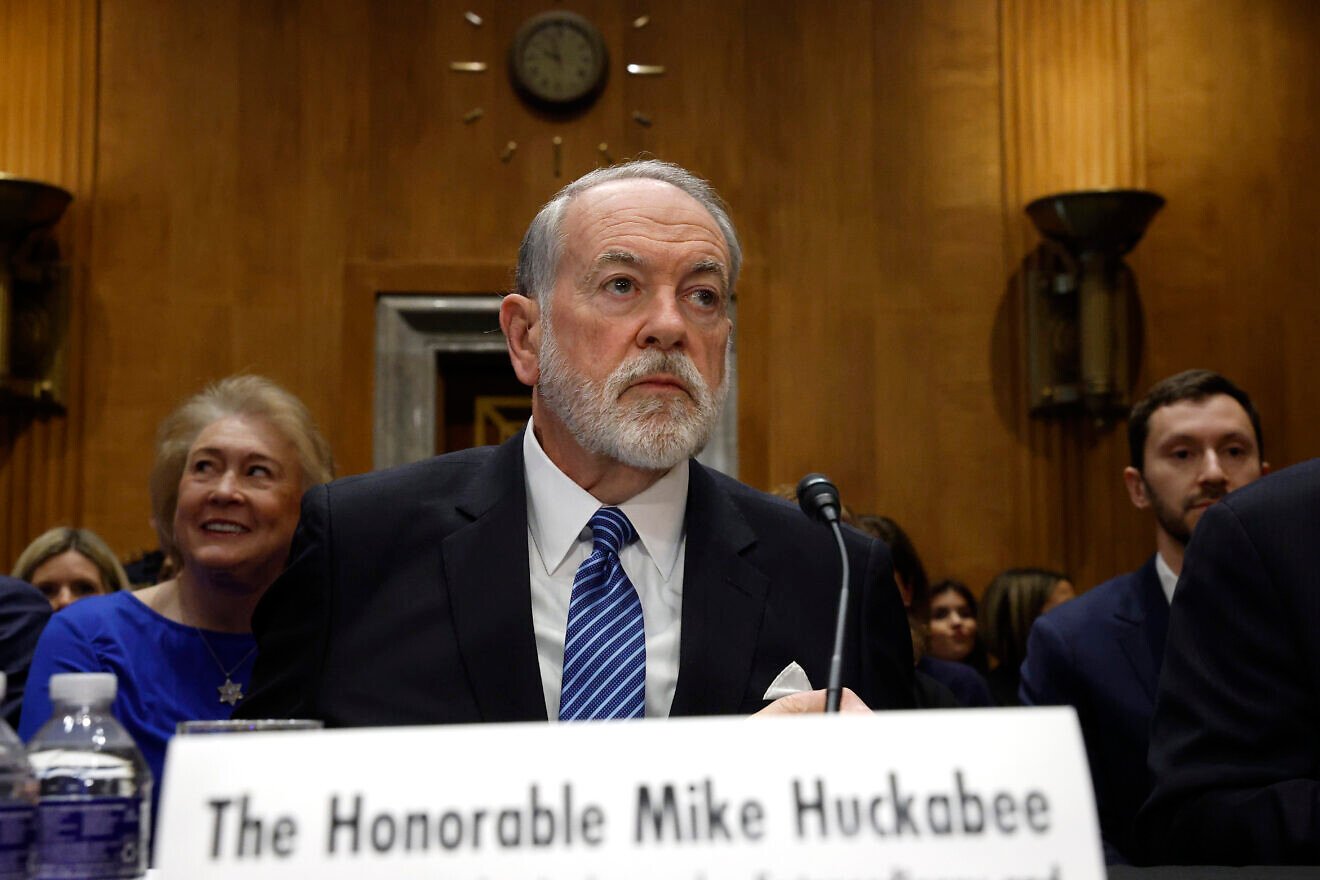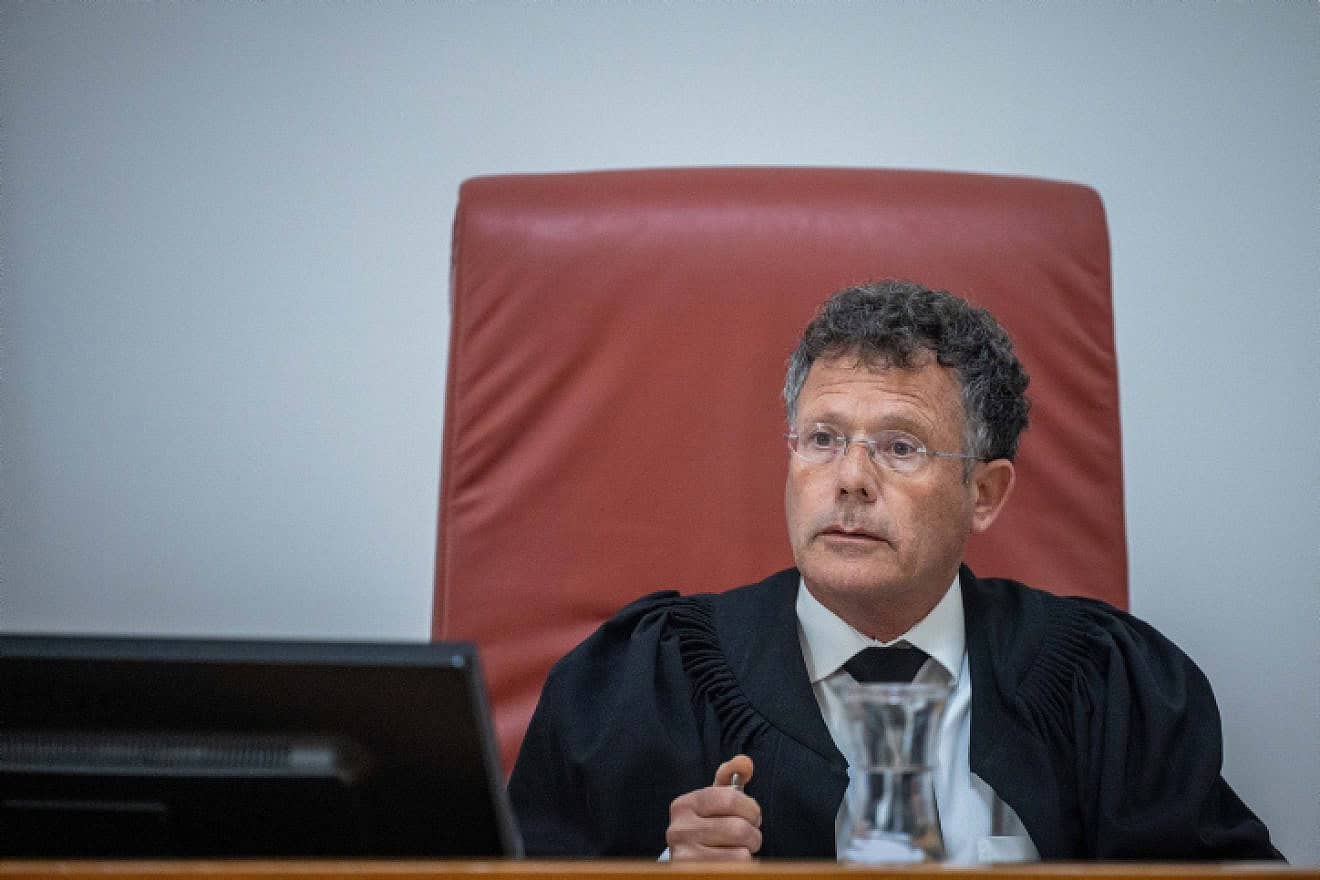by Jonathan S. Tobin
The opposition of liberal groups and Reform Judaism to the ardently Zionist former Arkansas governor reflects something darker than just partisanship.
 |
| Former Arkansas Gov. Mike Huckabee, U.S. President Donald Trump's
nominee to be ambassador to Israel, testifies during his Senate Foreign
Relations Committee confirmation hearing at the Dirksen Senate Office
Building on March 25, 2025 in Washington, D.C. Photo by Kevin
Dietsch/Getty Images. |
Nobody seriously believes that the U.S.
Senate will reject President Donald Trump’s nomination of former
Arkansas Gov. Mike Huckabee to be ambassador to Israel. Republicans
managed to get far more controversial nominees, such as Defense
Secretary Pete Hegseth, Health and Human Services Secretary Robert F.
Kennedy, Jr. and Director of National Intelligence Tulsi Gabbard
confirmed, so they should have comparatively little trouble pushing
Huckabee, a man without skeletons in his closet, over the goal line.
Indeed, it’s likely that he will be in
Israel, as he predicted, by Passover. But that hasn’t stopped the Jewish
left from trying to stop his nomination.
The political arm of Reform Judaism is publicly opposing
Huckabee. So too are the left-wing lobby J Street and the Jewish
Democratic Council of America. The Jewish Council for Public Affairs, an
umbrella group of Jewish community relations councils around the
country, didn’t condemn the nomination outright but made clear its
disdain for him with comments deprecating him as a “Christian
nationalist.”
These views were summed up in an op-ed published in The Hill
by Lily Greenberg Call, a veteran Democratic operative who had worked
for the campaigns of former President Joe Biden and former Vice
President Kamala Harris and resigned from a post at the Department of
the Interior because she felt the Biden-Harris administration was too
supportive of Israel after the Oct. 7, 2023 massacre. “Unconditionally
supporting Israel actually makes Jews unsafe” and the Jewish state is
“antithetical” to “Jewish values,” Call asserted.
On the other side of the issue, more
mainstream, liberal Jewish groups like the Anti-Defamation League and
the American Jewish Committee said that they looked forward to working
with Huckabee. More ardently pro-Israel groups like the Zionist
Organization of America and the Orthodox Union endorsed him
enthusiastically.
Seen in that context, it’s easy to dismiss
Huckabee’s Jewish critics as outliers or merely predictably partisan.
But that would be a mistake.
Christian nationalism?
The angry response to Huckabee from the
Jewish left echoes something deeply troubling about American Jewry’s
attitudes toward both Israel and its Christian supporters, like the
former governor. And the talk about “Christian nationalism” reflects a
broader backlash among political liberals in general against any
expression of faith in the public square.
At its heart, liberal Jewish distrust of
the strong backing Israel gets from evangelicals and other conservative
Christians is a function of three factors. One is simple partisanship.
Another is the shocking and quite irrational religious prejudice on the
part of some Jews. The other is the notion that faith should influence
public policy.
The latter was put on display in the viral comments that former Politico reporter Heidi Przybyla uttered on MSNBC in February 2024.
Przybyla condemned political conservatives
and Trump backers as “Christian nationalists,” because they believe
that the rights of all Americans “don’t come from any earthly
authority,” she said “They don’t come from Congress or the Supreme
Court. They come from God.”
That is something that Huckabee believes.
But that belief was shared by all of America’s Founding Fathers, not
least a non-denominational Deist like Thomas Jefferson. It was, after
all, the man who would eventually become the third president of the
United States who wrote in the Declaration of Independence that it was
“self-evident” that all Americans were “endowed by their Creator with
certain unalienable rights.”
While Przybyla was widely skewered for her
ignorant comments, she was reflecting the wide gap that has opened up
between people of faith, regardless of their religion, and those who
have contempt for traditional religion. Sadly, nothing reflects that
divide more closely than attitudes toward Israel.
Faith and antisemitism
As a Gallup poll
published last June suggested, support for Israel in the United States
is primarily a function of religious faith. And declining religiosity is
directly linked to growing hostility to Israel.
The survey, which tracked opinions about
the Jewish state and the Palestinians over the last quarter-century,
demonstrated that support for Israel was far more prevalent among those
who attended religious services regularly, and it declined among those
who did not attend a church or a synagogue.
The study also provided at least a partial
explanation for the generational differences about Israel. If younger
Americans are less supportive of Israel than older ones, it is to some
extent the result of their being less religious than their elders. The
fact that people 29 or younger are also more likely to have been
indoctrinated in the toxic neo-Marxist ideas of critical race theory,
intersectionality and colonial-setter ideology that brands Israel and
the Jews as “white” oppressors—and which is antithetical to traditional
faith—is also part of this depressing trend.
That’s just as true for younger Jews. Most
of them have had the woke catechism of diversity, equity and inclusion
(DEI), which ironically excludes Jews, drilled into them in K-12 schools
and again in college. That makes them more inclined to think that a
concept is inappropriate if it is antithetical to the principles of
equal opportunity and individual rights. It also makes them more
inclined to think a sectarian Jewish state is somehow racist, or that
Jews somehow are not the indigenous people of their ancient homeland.
That liberal Jews and those organizations
that are most influenced by this doctrinaire secularism is also part of
their alienation from Israel is unsurprising. The fact that some, like
most of those affiliated with the Reform movement, are avowedly
religious may seem like a contradiction in terms. But it’s easily
explained when you realize that they see their religious beliefs, as
many liberal Jews do, as not so much a matter of faith in revelation or
scripture but a reflection of their opinions on political issues, which
they define as social justice.
Their discomfort with Christians, like
Huckabee, who believe that the Almighty has promised that they will be
blessed if they bless Israel, may seem counterintuitive. But it is part
of an aggressively woke and secular mindset that sees such beliefs as
inherently illegitimate.
Though many cast most of the blame for a
decline in Jewish support for Israel on Prime Minister Benjamin
Netanyahu as well as partners in his coalition who are members of
right-wing and religious parties, the truth is it has far more to do
with the demography of a community that is rapidly assimilated and the
prevailing ideology on the American left. As JNS reported
recently, the Pew Research Center has published a study that indicated
that less than 1% of Israeli adults raised Jewish say that they’ve
“switched” faiths, compared to 24% of U.S. adults raised Jewish.
Of course, partisanship is also part of
the opposition to Huckabee. In this, the most hyper-partisan moment in
living memory, Jewish Democrats can be counted on to oppose just about
anyone whom Trump nominates for office.
But it’s important to understand that the
fact that Trump is the most pro-Israel U.S. president since the creation
of the modern-day Jewish state cuts no ice with Jews on the political
left. For the most part, even those who are still at least nominally
Zionist think of Israel as only legitimate if it reflects their
secularism and their ideas about how to solve the conflict with the
Palestinians.
The fact that in recent decades, the
Israeli electorate has, for the most part, voted for leaders from the
right like Netanyahu is problematic for many American Jews. And the
understandable Israeli support for Trump has caused many of them to see
Israel as the moral equivalent of a “red state.”
Unlike their Israeli counterparts, they
have little understanding about the rejectionist ideology of Palestinian
Arabs. Palestinians have repeatedly refused offers of statehood and
independence when it meant they must live in peace with a Jewish state
no matter where its borders might be drawn. This has made little
impression on liberal Americans, including Jews.
This disconnect with normative Israeli
political views, which have only been reinforced by the horrors of Oct. 7
and its aftermath that made the notion of a two-state solution not so
much a bad idea but madness, is made clear when you hear the left’s
criticisms of Huckabee.
The idea that Israel needed to be “saved
from itself,” as former President Barack Obama believed, is integral to
liberal Jewish attitudes toward Israel. That anyone would still think
that, after Oct. 7, an independent Palestinian state would mean anything
but more war and bloodshed for both peoples is hard to explain. But the
alienation of American Jews from the realities on the ground in the
Middle East is so great that nothing, not even the launching of a
genocidal war endorsed by most Palestinians, will dissuade them from
their ignorance.
Yet the disdain for pro-Israel Christians, such as Huckabee who told me in an interview with him on my podcast
that the conflict between Israel and its enemies is between “good and
evil,” is not just a matter of politics. It also stems from their
sneering contempt for evangelicals.
Much like the rest of America’s
credentialed elites, of which they are so representative, liberal and
left-wing Jews look down their noses on that broad section of the
American electorate that is deeply religious. It’s not just that they
disagree with them on abortion, gun rights or any other issue. They have
held onto notions about the connection between religious belief and
antisemitism that may have made sense a century ago but are now badly
outdated.
Contempt for evangelicals
In 19th century Europe or early 20th
century America, it may have been reasonable to think that the more
religious Christians were, the more likely they would be antisemitic.
But now it’s just the opposite. As the Gallup poll showed, it is people
of faith, especially those outside of the shrinking mainline Protestant
denominations, who are the most philo-semitic and supportive of Israel.
Conversely, it is the most aggressively secular and most educated
demographic slices of America that are heavily influenced by woke
ideology and lingering neo-Marxist hostility to Judaism that are the
most antisemitic.
Yet most liberal Jews on the two coasts
still think of conservative Christians as flyover country hayseeds, who
would gladly kill all the Jews but aren’t smart enough to figure out how
to do so. Such a murderous desire is normative among Palestinian Arabs
and the bizarre red-green alliance of Marxists and Islamists elsewhere
that supports their war on Zionism, but it is not among evangelicals.
Still, that fact hasn’t dented the consciousness of Jews who
instinctively distrust Huckabee and everyone like him.
The argument that conservative Christians’
support for Israel can’t be trusted because of their eschatological
beliefs is particularly illogical as well as deeply foolish. Most
Christian Zionists do not predicate their love for Israel on the idea
that its survival is part of an end-of-days scenario that will lead to
the return of Jesus. But even if all did believe that, why should
Jews—whether they are secular or religious, liberal or conservative—care
if they don’t think that will ever happen?
A pro-Israel ambassador
One doesn’t have to like Trump or be
comfortable with the political views of evangelicals such as Huckabee to
believe that the latter’s wholehearted support for Israel and realistic
views about Palestinian intentions are not only sincere but a very good
thing.
Prior to David Friedman, who served as
ambassador to Israel during the first Trump administration, all U.S.
ambassadors to Israel treated Jerusalem the way Roman proconsuls viewed
subject peoples. They were primarily there to order Israelis around and
impose policies based on failed “land for peace” patent nostrums. Their
priority was not, as is the case for most American ambassadors to
foreign countries, to promote better relations between their hosts and
the United States.
Friedman was a powerful advocate for a
rational policy based on the realities of the conflict rather than the
conventional wisdom of the “experts” of the foreign policy establishment
who had steered U.S. Middle East policy for decades.
As much as anyone, he deserves the credit
for persuading Trump to ignore them and move the U.S. embassy from Tel
Aviv to Jerusalem in 2018 and steered the president toward diplomacy
that would end the ability of the Palestinians to hold the peace process
hostage to their intransigent fantasies of Israel’s destruction.
Huckabee will be equally supportive of the
alliance and of Jewish rights and realistic about the Palestinians.
And, as an evangelical, his presence in Jerusalem can do much to promote
better interfaith relations. Yet for liberal Jews who believe that
Israel must make suicidal concessions to Palestinians, whose goal is to
destroy the Jewish state, and who have no interest in good relations
with evangelicals for reasons that have nothing to do with foreign
policy, his nomination is anathema.
Attitudes toward the Huckabee nomination
are, therefore, something of a test of American opinions about faith,
radical ideologies and whether American foreign policy should aim at
strengthening Israel’s efforts to defeat enemies or to weaken them. That
so many Jews oppose him is a disturbing reminder of the profound
problems currently facing American Jewry.
Jonathan S. Tobin is editor-in-chief of the Jewish News Syndicate, a senior contributor for The Federalist, a columnist for Newsweek and a contributor to many other publications. He covers the American political scene, foreign policy, the U.S.-Israel relationship, Middle East diplomacy, the Jewish world and the arts. He hosts the JNS “Think Twice” podcast, both the weekly video program and the “Jonathan Tobin Daily” program, which are available on all major audio platforms and YouTube. Previously, he was executive editor, then senior online editor and chief political blogger, for Commentary magazine. Before that, he was editor-in-chief of The Jewish Exponent in Philadelphia and editor of the Connecticut Jewish Ledger. He has won more than 60 awards for commentary, art criticism and other writing. He appears regularly on television, commenting on politics and foreign policy. Born in New York City, he studied history at Columbia University.
Source: https://www.jns.org/huckabee-nomination-a-test-for-us-jews/
Follow Middle East and Terrorism on Twitter













